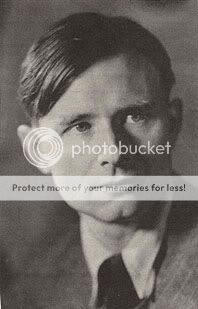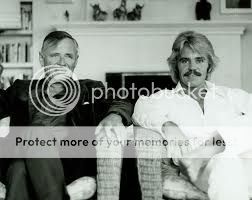
Christopher Isherwood. Photo: nndb.com.
I was in my early twenties and living in Vienna, Austria when I discovered the writing of Christopher Isherwood, and did so as many people do, by reading Goodbye to Berlin (1939). I devoured it in days and made a mad dash back to the Sterngasse and Shakespeare & Company for a copy of Mr Norris Changes Trains (1935) (also known as The Last of Mr. Norris) which to my delight dealt with the same period during which Isherwood was living in Berlin from 1929 to 1933.
Over the next few years, as time permitted, I worked through the published opus of Isherwood (including the plays with Wystan Auden: The Dog Beneath the Skin (1932), which Isherwood and Auden used to refer to as "Dogskin", The Ascent of F6 (1936), and On the Frontier (1938) all three of which are, I hate to say, nearly unreadable today. What I found most interesting were his diaries which is where I found great insight into a gay male life lived in a way which was very much ahead of its time.
Follow me over the fold for more...
A Brief Biographical Overview
Note: a more comprehensive but still brief overview with tie-ins to his literary works can be found at the Isherwood Foundation website.
Christopher Isherwood was born near Manchester, England in 1904 to an affluent and educated family. He attended Cambridge but did not take his degree. In the 20's and 30's he formed part of a circle of writers and artists many of whom were becoming or went on to become famous themselves, chief among them Wystan Auden (with whom he collaborated and had an intermittent sexual affair which he describes in one of his autobiographies as "awkward"), Stephen Spender, Edward Upward and the composer Benjamin Britten. From 1929 to 1933 he lived in Berlin, supporting himself teaching English and pursuing an avocation as a Communist camp-follower. People he met there, like Jean Ross (who would become Sally Bowles in his "Berlin" Books and the subsequent stage and film adaptations, the most famous of which is Cabaret) made their way as composite characters into his novels.
During his time in Berlin, Isherwood began a relationship with a young German named Heinz Nedermeyer (this relationship, too, found its way into his writing). They fled together in 1933 and remained in a vagabond state until Heinz' arrest as a draft evader in 1937.
After a trip to China with Auden, both men immigrated to the US in 1939 (Isherwood became a citizen in 1946) and as pacifists, were criticized by their British compatriots for not returning to England during WW II. Isherwood settled in California and pursued screenwriting, among other things. Over the years he formed friendships with many luminaries including the Stravinskys and the young American writer Truman Capote. In the early 50's, he had a tempestuous affair with the photographer Bill Caskey, with whom he produced a South American travel book called The Condor and the Cows (1947).
In the US, Isherwood converted to Hinduism as a follower of Swami Prabhavananda in Southern California with whom he made a translation into English of the Bhagavad Gita. He thought of becoming a monk, but his guru talked him out of it. Isherwood wrote about his experiences with Vedanta and his contemplation of monastic life in his 1967 novel A Meeting by the River.
Perhaps the most momentous occurrence was his meeting the young (teen-aged) Don Bachardy in 1953. Despite their age difference, the two formed a bond and a relationship which would last until Isherwood's death from prostate cancer in Santa Monica in1986. Bachardy was encouraged by Isherwood to pursue his painting and became an important artist in his own right.

Christopher Isherwood and Don Bachardy
Isherwood's Diaries
While it is beyond the scope of this diary to treat each one of his novels in detail, it is in his published diaries and autobiographical writings that we gain much insight into not only the background of his novels but into the details of his gay life and how he lived it. Two important diaries, Diaries: 1939–1960 and Lost Years: A Memoir 1945–1951 (which relies heavily on his diaries and reconstruction of those years in diary form) as well as his 1976 autobiography Christopher and his Kind explore his sexuality in detail which is at times shocking. In discussing his relationship with Caskey in Lost Years he surprises the reader with a foray into sexual practices, saying the he and Caskey enjoyed doing things "most gay men like to do" and then goes on to name some of them citing "s*cking, f*cking and r*imming" and waxes a bit poetic about the hirsute Caskey's "musky aroma". Isherwood was in the habit of referring to himself in the third person (also in conversation, something confirmed by my brief interview with Kossack desertguy who knew Isherwood during the last years of his life) and much of the diaries are highly formal in tone making some of the details all the more shocking. Compared with the diaries of another famous gay diarist, the composer Ned Rorem who's prose is informal and highly salaciously detailed, Isherwood shocks precisely because these tidbits are not expected to come out of his pen.
What emerges from these diaries is that Isherwood was an author and a man who reconciled his homosexuality to himself quite early on and determined to live as honest and open a gay life as possible in California at that time and that he pushed that envelope frequently.
As formal and refined as Isherwood's prose can be, he certainly had a reputation for a sense of humor, and a strange one at that. Stephen Spender recalled that Isherwood had a habit of "getting tight" at parties and tinkling in the corners of his host's living rooms. It's unclear how often he did this, but it certainly seems in character for a man who, according to Joanne Carson, spoke briefly at Truman Capote's memorial service stating only that Capote "always made me laugh" then proceeding to laugh while tinkling his pants. How much of this was in character and how much of it had to do that he was ill with prostate trouble we'll never know, however I have always connected Spender's and Carson's recollections in my mind.
Another thing which emerges from the autobiographical and semi-autobiographical (like the Berlin stories) writings is an honest picture of the gay scene in Berlin between the wars. Sexuality was being liberated in Germany as early as 1900 (and even before) and sexual liberation for men and women of all orientations was in full steam in the 1920's and early 30's. Isherwood's experiences (especially with "rough trade" hustlers) confirms the heady, forward-looking semi-openness about homosexuality emerging in Berlin at the time. Spender also confirms this.
Ishwerwood's Gay Aesthetic
The progression of his writing incorporating his homosexuality begins quite subtly and ends quite boldly with what I consider to be his masterpiece, the short 1964 novel A Single Man. In this short book, the protagonist, George, a college professor, is followed over a 24 hour period during which he loses his longtime lover to an accident, becomes infatuated with a student, and subsequently, dies. Moving slowly, this tour-de-force explores the deep, emotional and psychological state of one man in a way rarely seen--or successful--in literature. Tom Ford, choosing this novel (rather ambitiously, I'd say) to adapt for his debut film of the same name in 2009 produced what I believe to be the most true adaptation of any piece of writing I have yet seen on the screen.
One of Isherwood's most famous contributions to the contemporary gay aesthetic was in the form of his definition of "camp" in 1954 novel The World in the Evening in which he says:
"You can't camp about something you don't take seriously. You're not making fun of it; you're making fun out of it. You're expressing what's basically serious to you in terms of fun and artifice and elegance."
This definition influenced Susan Sontag in her "Notes on Camp".
Isherwood's greatest contribution as a gay literary figure is clearly his openness to exploring sexual identity and orientation, his characters struggles with that identity, and the boldness (at the time) which which he lived his life. In many ways, here is a novelist and diarist ahead of his time, paving the way for the explosion of gay fiction in the 1980's and 1990's. It is my opinion that without Isherwood, this explosion may not have been possible.
A Very Special Interview
I had the opportunity to ask some questions of Kossack desertguy who got to know Isherwood in the last seven years of his life. I'd like to share some of his responses, and desertguy should be around this morning to participate in this diary. Here's some of what he shared with me about his personal recollections of the author:
On the third person and Don:
Yes, Chris referred to himself in the third person in conversation, but I don't remember him doing it all the time. My friend Paul used to tease him with a 'We are not amused!' Elizabeth II parody that we thought was pretty funny. I didn't know Don as well, but Chris was 75 when I met him, so they were both a lot older than me. But it seemed like Don fussed over Chris more than I was used to seeing. I do think maybe Don was a little envious of the number of Chris' fame and famous friends, and maybe Don wanted to make more of a name for himself for his own talents. He was very talented in his own right. But, for most of their relationship Don was famous for being with Chris.
On Isherwood's politics in the 80's:
But, he was amazing to know and to learn from. He warned us in the run up to the 1980 election that Ronald Reagan could win and that it might embolden the corporatists (fascists) and other nuts that would want to silence gay people and shove us back in the closet. He had a lot of antipathy for the McCarthy-ites and the rightwing Reagan fanatics. I don't how many people he discussed politics with, but since he knew we were outspoken openly gay liberals he seemed to enjoy talking with us. Politics and gay rights were something that only seemed to be a focus for him much later in life. Some of his friends (like the Bradburys) were conservative. But, they were smart people, too - not intolerant Tea Party idiots. I am sure seeing Dubya installed as president might've killed Chris had he lived until the year 2000!!!
On gay rights:
But most of the time we went somewhere or talked on the phone we discussed gay rights or politics of the day - especially how gay rights progress was not guaranteed. I especially enjoyed listening to the salacious stories from his life in the decades prior to his meeting Don in the 1950s.
Again, clearly progressive on the front of gay liberation and politics in general, as he had been throughout his life. It is hardly surprising that this found its way into his novels and memoirs.
Thank you all for reading. Special thanks indeed to desertguy for contributing to this diary and being willing to answer some of my questions about Chris.
I look forward to discussion in the comments.


